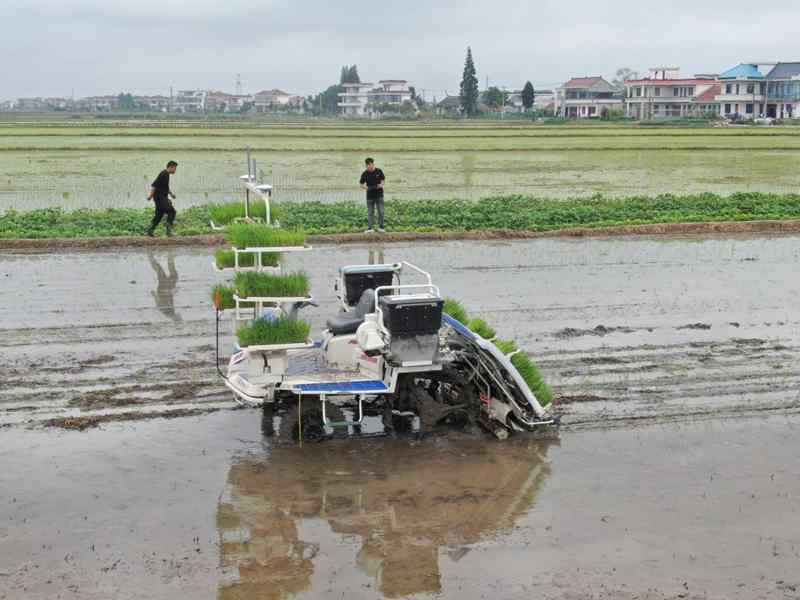China’s BeiDou system facilitates economic, social development

An unmanned transplanter equipped with the BeiDou Navigation Satellite System (BDS) works in the fields of a new cooperative farm in Yumin village, Shizong township, Tongzhou district, Nantong city, east China’s Jiangsu province, July 2021. (People’s Daily Online/Xu Congjun)
China’s self-developed BeiDou Navigation Satellite System (BDS) has been deeply integrated into a wide range of industries and is facilitating the country’s economic and social development.
Since the BDS, or what is known as BDS-3, was officially commissioned on July 31, 2020, it has continued smooth operations and has provided reliable and high-quality positioning, navigation and timing (PNT) services for global users, which underpins economic and social development, introduced Ran Chengqi, director of the China Satellite Navigation Office.
The BDS has played an increasingly stronger role in driving economic and social development. The application of the system has expanded continuously in scale and extent and has entered a critical stage in its marketization, industrialization and internationalization.
The system has been widely applied in industries such as transportation, public security, emergency management, agriculture, forestry, animal husbandry, and fisheries, as well as being integrated into power, finance and communication infrastructures. It is also empowering consumer goods, the sharing economy, and the livelihood sector, generating sound economic and social benefits.
The industrial scale of China’s satellite navigation industry exceeded 400 billion yuan (about $59.2 billion), according to statistics from the National Development and Reform Commission (NDRC). By the end of 2021, there were more than 1 billion units and terminals using the BDS positioning function nationwide.
As of the end of 2021, over 7.9 million vehicles had been equipped with the BDS; close to 8,000 sets of BeiDou terminals of various types had been used in the railway sector; over 100,000 agricultural machines had been equipped with self-driving systems based on the BDS; more than 15,000 BeiDou terminals had been used in forest fire prevention; and, the output value of downstream operations and service links, including health care, remote monitoring and online services, reached nearly 200 billion yuan.
In addition, comprehensive breakthroughs have been made in the BDS’s application in scenarios more closely related to people’s life, including mobile phones and smart wearable devices. Last year, shipments of China’s smartphones supporting BDS services reached 324 million units, accounting for 94.5 percent of the country’s total smartphone shipments.
The high-precision positioning and timing information services offered by the BDS had been used over 100 billion times per month as of March 2022. The number of monthly requests for the system’s acceleration auxiliary positioning service has already exceeded 60 billion, while monthly requests for its real-time high-precision positioning services with centimeter-level accuracy and sub-meter level accuracy has surpassed 48 billion.
The system’s high-precision positioning and timing information services have been used in equipment and devices ranging from mobile phones, automobiles, drones, shared bikes and buses, to road infrastructure facilities, as well as equipment used for bridges and mines.
The BeiDou system has provided high-precision positioning and timing services for a total of more than 1.1 billion people in over 100 countries and regions around the world.
China will promote the deep integration of the BDS and emerging technologies such as 5G communications, big data, andthe Internet of Things in order to develop a larger variety of new industries and new business models, according to an official with the Department of Innovation and High-Tech Development under the NDRC.
The industrial scale of the BDS is expected to reach 1 trillion yuan after 2025, according to Yang Changfeng, chief designer of the BDS.
By 2035, China will build a more ubiquitous, integrated and intelligent comprehensive national PNT system centered on the BDS to provide core support for the development of intelligent and unmanned systems.
By then, the BDS will better serve users from across the world and benefit all of mankind by providing global users with full-coverage and highly reliable PNT services whether indoors or outdoors, and whether in the deep sea or in deep space.
Photos
 China’s central bank to issue commemorative coins on cultural theme of auspiciousness, including two heart-shaped coins
China’s central bank to issue commemorative coins on cultural theme of auspiciousness, including two heart-shaped coins Population of endangered black-headed gulls exceeds 10,000 mark in NE China’s coastal city of Panjin
Population of endangered black-headed gulls exceeds 10,000 mark in NE China’s coastal city of Panjin China's self-developed floating airship breaks record
China's self-developed floating airship breaks record Chinese germplasm bank conserves biodiversity in warm temperate zone
Chinese germplasm bank conserves biodiversity in warm temperate zone
Related Stories
- BeiDou fully serving China's socioeconomic development
- BeiDou boosts tech support in Chinese smartphone industry
- China’s BeiDou system provides global users with high-precision positioning, timing services
- China’s BeiDou system enters new stage of continuous and stable services, rapid development
- BeiDou directed seeders work in Xinjiang's cotton fields
- China’s BeiDou Navigation Satellite System embarks on new journey of global, industrial development
- Latest progress in China's BeiDou Navigation Satellite System
- BeiDou navigation base in south China targets services in ASEAN
- Ten things you need to know about China's BeiDou navigation system
- To carry forward Beidou spirit in new era
Copyright © 2022 People's Daily Online. All Rights Reserved.






